英语4.6级方法二
两年考四六的步骤计划

时间阶段
学习重点
具体行动
目标
第一年(基础巩固期)
第1-3个月
词汇积累
- 每天背诵50-80个单词(根据四级或六级词汇表)- 使用单词软件或词汇书籍辅助记忆- 每周复习本周所学单词,巩固记忆
积累3000-5000个基础词汇
第4-6个月
语法与句型
- 学习并理解英语基本语法结构- 练习句子翻译,增强语感- 每周至少完成一次语法练习,查漏补缺
全面提升英语能力,为第二年备考打下坚实基础
掌握基础语法和句型,提升写作和翻译能力
第7-9个月
听力与阅读初步训练
- 每天进行30分钟的听力训练(BBC、VOA等)- 每周至少完成2篇阅读理解练习- 逐步增加听力和阅读的难度,适应考试节奏
初步提升听力和阅读能力,积累语感
ቤተ መጻሕፍቲ ባይዱ第10-12个月
综合提升
- 每月进行一次模拟考试,检验学习成果- 分析错题,找出薄弱环节,针对性加强- 继续保持词汇、语法、听力和阅读的日常练习
CET4,6的一些考试技巧
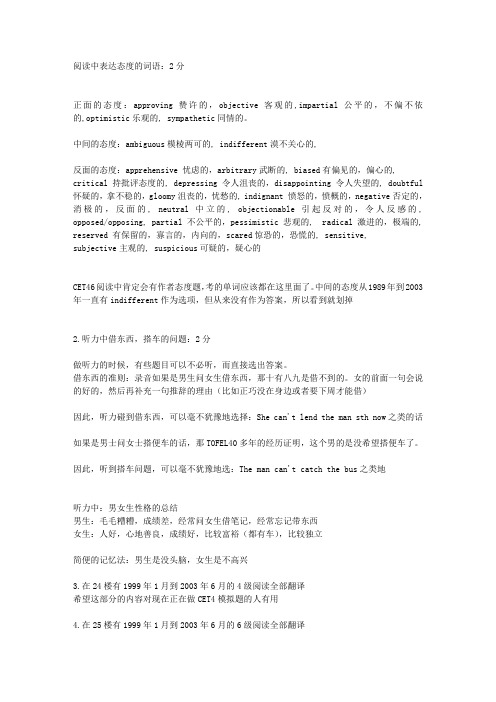
阅读中表达态度的词语:2分正面的态度:approving赞许的,objective客观的,impartial公平的,不偏不依的,optimistic乐观的, sympathetic同情的。
中间的态度:ambiguous模棱两可的, indifferent漠不关心的,反面的态度:apprehensive 忧虑的,arbitrary武断的, biased有偏见的,偏心的, critical持批评态度的, depressing 令人沮丧的,disappointing令人失望的, doubtful 怀疑的,拿不稳的,gloomy沮丧的,忧愁的, indignant 愤怒的,愤概的,negative否定的,消极的,反面的, neutral中立的, objectionable引起反对的,令人反感的, opposed/opposing, partial 不公平的,pessimistic 悲观的, radical激进的,极端的, reserved 有保留的,寡言的,内向的,scared惊恐的,恐慌的, sensitive,subjective主观的, suspicious可疑的,疑心的CET46阅读中肯定会有作者态度题,考的单词应该都在这里面了。
中间的态度从1989年到2003年一直有indifferent作为选项,但从来没有作为答案,所以看到就划掉2.听力中借东西,搭车的问题:2分做听力的时候,有些题目可以不必听,而直接选出答案。
借东西的准则:录音如果是男生问女生借东西,那十有八九是借不到的。
女的前面一句会说的好的,然后再补充一句推辞的理由(比如正巧没在身边或者要下周才能借)因此,听力碰到借东西,可以毫不犹豫地选择:She can't lend the man sth now之类的话如果是男士问女士搭便车的话,那TOFEL40多年的经历证明,这个男的是没希望搭便车了。
因此,听到搭车问题,可以毫不犹豫地选:The man can't catch the bus之类地听力中:男女生性格的总结男生:毛毛糟糟,成绩差,经常问女生借笔记,经常忘记带东西女生:人好,心地善良,成绩好,比较富裕(都有车),比较独立简便的记忆法:男生是没头脑,女生是不高兴3.在24楼有1999年1月到2003年6月的4级阅读全部翻译希望这部分的内容对现在正在做CET4模拟题的人有用4.在25楼有1999年1月到2003年6月的6级阅读全部翻译希望这部分的内容对现在正在做CET6模拟题的人有用针对3,4的点评:没有时间的朋友可以直接看翻译的文章,然后对着选项找答案。
CET4、6考试技巧(洛基英语提供)
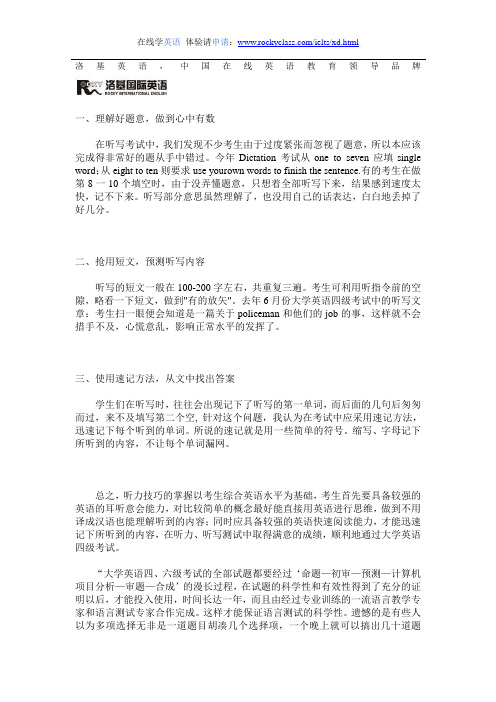
洛基英语,中国在线英语教育领导品牌一、理解好题意,做到心中有数在听写考试中,我们发现不少考生由于过度紧张而忽视了题意,所以本应该完成得非常好的题从手中错过。
今年Dictation考试从one to seven应填single word;从eight to ten则要求use yourown words to finish the sentence.有的考生在做第8一10个填空时,由于没弄懂题意,只想着全部听写下来,结果感到速度太快,记不下来。
听写部分意思虽然理解了,也没用自己的话表达,白白地丢掉了好几分。
二、抢用短文,预测听写内容听写的短文一般在100-200字左右,共重复三遍。
考生可利用听指令前的空隙,略看一下短文,做到"有的放矢"。
去年6月份大学英语四级考试中的听写文章:考生扫一眼便会知道是一篇关于policeman和他们的job的事,这样就不会措手不及,心慌意乱,影响正常水平的发挥了。
三、使用速记方法,从文中找出答案学生们在听写时,往往会出现记下了听写的第一单词,而后面的几句后匆匆而过,来不及填写第二个空, 针对这个问题,我认为在考试中应采用速记方法,迅速记下每个听到的单词。
所说的速记就是用一些简单的符号。
缩写、字母记下所听到的内容,不让每个单词漏网。
总之,听力技巧的掌握以考生综合英语水平为基础,考生首先要具备较强的英语的耳听意会能力,对比较简单的概念最好能直接用英语进行思维,做到不用译成汉语也能理解听到的内容;同时应具备较强的英语快速阅读能力,才能迅速记下所听到的内容,在听力、听写测试中取得满意的成绩,顺利地通过大学英语四级考试。
“大学英语四、六级考试的全部试题都要经过‘命题—初审—预测—计算机项目分析—审题—合成’的漫长过程,在试题的科学性和有效性得到了充分的证明以后,才能投入使用,时间长达一年,而且由经过专业训练的一流语言教学专家和语言测试专家合作完成。
这样才能保证语言测试的科学性。
CET46大学英语四六级词汇形象记忆法

CET4.6大学英语词汇形象记忆法答题要点:1、同义词均不选: 特点:喜欢考难的单词,eg: homogeneously同一的基因(前缀词根adj adv)订房间:make a reservation(出现两次)商业方面的约定:commitment一般的约定:engagement(也指订婚)秀色可餐,太美了:gorgeous签租约:lease抵押,贷款:mortgage分期付款:installment与……相冲突:collide with2.四六级的最爱:deprive of 剥夺;budget 预算;compensation 弥补,补偿eternal永恒的;intuition 直觉;penalty 惩罚,点球;potential 潜在的;in terms of在……方面;sheer完全的;trivial 琐碎的;3. 四六级的旧爱:regardless of 除了4. 四六级新宠(2002)demonstrate 演示;demonstrated beauty 倾国倾城;mingled情感、的气息、的气味的混合5. 永陪词汇(永远不成为答案):claim有100多条解释Constrain6. 陪考:empirical 凭经验的,主观的7. 出现giant panda/species 就选死光光,绝种extinct8. 记忆方法:词根法+联想法1) spir=breath(呼吸)cess=go(走路)inspire吸入空气-->产生灵感access一再地走-->接近conspiracy共同呼吸-->同谋者一再expire断气-->过期,满期excess超过-->过渡perspire出汗,流汗超出aspire不断地呼吸-->渴望recess走回来-->休息process前进,加工2) vers=turn(旋转)form 形式universe 围绕地旋转-->宇宙reform 一再地改变形式--> 改革uniform单一的,同样的conform 共同->符合converse 扭转perform 演出deform 不好的形式-->畸形reverse 颠倒,反转,倒带不好diverse 不同的vertigo 头晕3) scend=climb(爬)ascend v.攀登,轻薄物体的上升,descendant n.后代(在你后面爬)聪明的,睿智的transcend v.超越,胜过4) sophy智慧声音从远处传来sophisticated 复杂的,老于世故的philosophy 哲学sophomore 大二生5) cest跑cur跑rupt=break(断裂)clude=closeancestor 在前面跑-->祖先precursor 在前面跑-->祖先excursion 跑出去-->旅游bankrupt 破产exclusive a.排他的,独占的,专属的interrupt 打断exclude v.排除在外exclusive interview 人物专访corrupt r双写+co=共同在断-->腐败-->破坏inclusive a.包围住的,包括的preclude v.预防,妨碍(6) scribe=write(写)ascribe 归因于subscribe在下面写-->订阅,提交conscribe 征兵circumscribe《西游记》”三打白骨精“中老孙给唐僧划了个圈,限制范围,保护他。
英语四级第二大部分技巧

英语四级第二大部分技巧英语四级第二大部分技巧【篇1】用计时器定到10—15min许多学生做阅读时间总是不够用,导致后来没时间做题,而sectionB语篇很长,更需要把握时间。
自己做练习题时设置好时间给自己压力。
先看问题,挑出其中的关键词一道题很长,需要在短时间内找到相应段落就需要记住题意,这样就需要关键词来快速记题并对应段落。
关键词一般是形容词+名词,或者动词,注意数字型关键词,可以直接定位。
(一般题中数字和文中数字一个是阿拉伯数字形式一个是英语形式)看完关键词后回到原文中进行快速扫读这一部分是泛读题,考生应该进行快速浏览,而不是一字一句全部明白意思,至于怎么泛读如何泛读需要考生多读几个*,总结出自己的习惯和办法,一般情况下对人名、地名进行的详细介绍和位置介绍可以跳过不读一定要明白这个题时根据关键词定位段落,答案大部分出自每个段落的第一句和最后一句,少数在第二句和倒数第二句。
当第一遍有题没有选出来时,详细读一下没有排除的段落的一二句。
有时候一个段落会对应两道题,如果文中有一个段落很长,那么要小心,这个长段有极大可能会出两道题的。
同时同一个关键词不会重复出题,要小心关键词的混淆,要看仔细。
注意事项掐好时间,慢慢提升速度要泛读快速扫读不要一字一句读,慢慢练习提高。
英语四级第二大部分技巧【篇2】卷面首先卷面一定要整洁,尤其是作文,最好给人一种一目了然的感觉.而且字要尽量工整.单词平时的时候有空就看看单词,查清单词的意思,注在边上。
这是背单词的好办法,在*中背,更利于记住.而考试的时候,遇到陌生的单词可以用排除法,或者大胆的去猜测.听力平时在做模拟题的时候,听力部分至少要听3遍,第1遍做题;对完答案以后,对照录音原文听第2遍;不看原文,听第3遍.而考试的时候一定要聚精会神地听,就算有几题没听到,不要被影响,专心的听接下来的题目.阅读阅读,在平时训练的时候,完整地读完它,做题,不要在乎对错,然后对照答案,一般都有汉语翻译,搞懂*到底说的是什么.考试的时候每个问题对应的答案在文中划线,找出依据.时间合理的规划好每个部分的时间,不在某一部分停留太长的时间,导致题目没有做完,造成失分.作文写作文前,时间充裕的话,先打下草稿.再在草稿上修改一下,给自己的作文增加点亮色,用一些别人很少用的高级词汇.最后再抄写到试卷上,尽量做到不修改.英语四级第二大部分技巧【篇3】单词。
大学英语四、六级兵法(二)
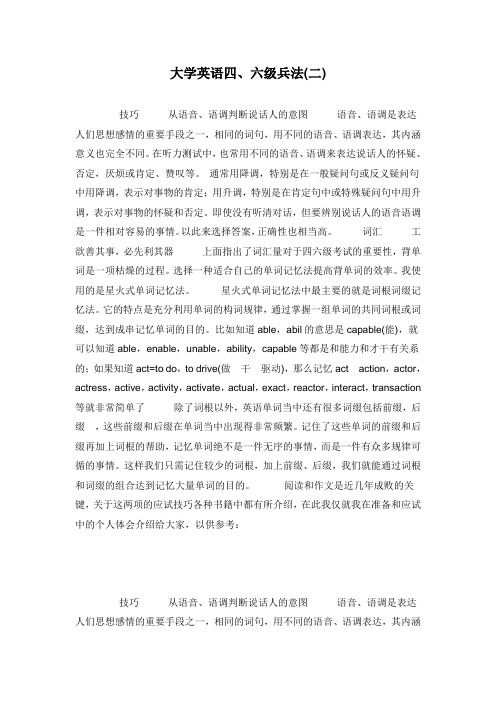
大学英语四、六级兵法(二)技巧从语音、语调判断说话人的意图语音、语调是表达人们思想感情的重要手段之一,相同的词句,用不同的语音、语调表达,其内涵意义也完全不同。
在听力测试中,也常用不同的语音、语调来表达说话人的怀疑、否定,厌烦或肯定、赞叹等。
通常用降调,特别是在一般疑问句或反义疑问句中用降调,表示对事物的肯定;用升调,特别是在肯定句中或特殊疑问句中用升调,表示对事物的怀疑和否定。
即使没有听清对话,但要辨别说话人的语音语调是一件相对容易的事情。
以此来选择答案,正确性也相当高。
词汇工欲善其事,必先利其器上面指出了词汇量对于四六级考试的重要性,背单词是一项枯燥的过程。
选择一种适合自己的单词记忆法提高背单词的效率。
我使用的是星火式单词记忆法。
星火式单词记忆法中最主要的就是词根词缀记忆法。
它的特点是充分利用单词的构词规律,通过掌握一组单词的共同词根或词缀,达到成串记忆单词的目的。
比如知道able,abil的意思是capable(能),就可以知道able,enable,unable,ability,capable等都是和能力和才干有关系的;如果知道act=to do,to drive(做干驱动),那么记忆act action,actor,actress,active,activity,activate,actual,exact,reactor,interact,transaction 等就非常简单了除了词根以外,英语单词当中还有很多词缀包括前缀,后缀,这些前缀和后缀在单词当中出现得非常频繁。
记住了这些单词的前缀和后缀再加上词根的帮助,记忆单词绝不是一件无序的事情,而是一件有众多规律可循的事情。
这样我们只需记住较少的词根,加上前缀、后缀,我们就能通过词根和词缀的组合达到记忆大量单词的目的。
阅读和作文是近几年成败的关键,关于这两项的应试技巧各种书籍中都有所介绍,在此我仅就我在准备和应试中的个人体会介绍给大家,以供参考:技巧从语音、语调判断说话人的意图语音、语调是表达人们思想感情的重要手段之一,相同的词句,用不同的语音、语调表达,其内涵意义也完全不同。
【最新2018】社会人员考4.6级英语-word范文模板 (24页)
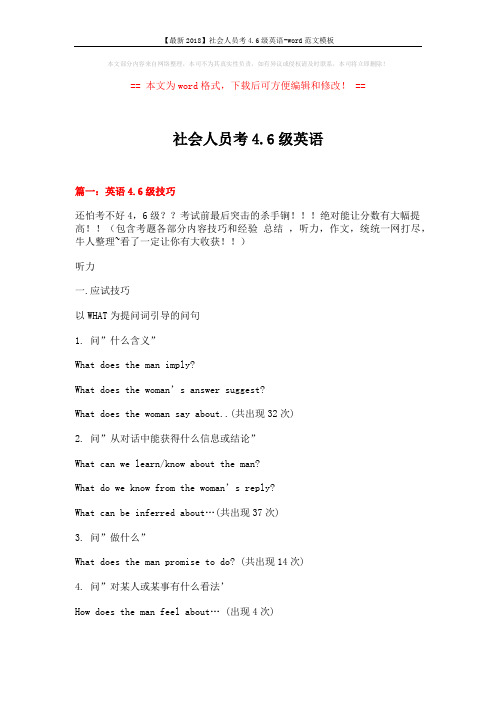
本文部分内容来自网络整理,本司不为其真实性负责,如有异议或侵权请及时联系,本司将立即删除!== 本文为word格式,下载后可方便编辑和修改! ==社会人员考4.6级英语篇一:英语4.6级技巧还怕考不好4,6级??考试前最后突击的杀手锏!!!绝对能让分数有大幅提高!!(包含考题各部分内容技巧和经验总结,听力,作文,统统一网打尽,牛人整理~看了一定让你有大收获!!)听力一.应试技巧以WHAT为提问词引导的问句1. 问”什么含义”What does the man imply?What does the woman’s answer suggest?What does the woman say about..(共出现32次)2. 问”从对话中能获得什么信息或结论”What can we learn/know about the man?What do we know from the woman’s reply?What can be inferred about…(共出现37次)3. 问”做什么”What does the man promise to do? (共出现14次)4. 问”对某人或某事有什么看法’How does the man feel about… (出现4次)小结:在短对话部分,考查最多的是WHAT类的提问,其中细节的考查相对较少,推断型的相对较多一些.二:常见考题类型1原因与结果题特征:1.至少有一个选项暗示出该事实能导致某种结果,通常有好几个选项的事实能导致同一结果2.选项中可能出现can’t, not be able to, too….to, have to等词或词组.3.文章承上启下的作用的信息句a.表示文章顺序与层次的句子,一般由first, second, in the end, in addition, furthermore, finally引导.b.表示意思转折的句子,一般由but, however, on the contrary, instead, unfortunately, however, yet, although, nevertheless等词引导c.表示因果关系的句子,一般由because, since, for, thus, as a result等引导2.职业与身份题特征:大部分情况下,选择项是有固定格式的,要么是4个不同的职业,要么是4个不同身份的人短语:a little out of the way 有点远三.长对话应试技巧注意:问答形式的对话是考试重点,往往落在其答语上.并且不是每一组问答都是重点,作为考试重点的几组问题之间的关联性是不大的.换句话说,第一个问题考查了文章的主旨,第二个问题开始分别考查对话中所呈现的几方面问题.其中每一个方面选择一个最重要的问题来考查.并且部分长对话还秉承了短文理解的一个重要的考查方式,就是在对话的开头部分一定会出题目方法:1.话题与场景的判断----第一句话中的核心词汇揭示答案在长对话中,寒暄过后的第一句话一般起到引出话题的作用,很可能是对话的主题所在,也是回答主旨,话题以及场景题的依据,正确的答案往往是核心词汇的重现,同义词,或者是由该单词所得出的自然的推论.2.细节题---听到什么选什么与短对话的区别就在于,短对话中一般采用的原则是听到什么就不选什么,而长对话恰恰相反,它考查的重点是那些含有实际意义的问答内容,尤其是特殊疑问句3.根据结尾处的核心词汇锁定答案长对话中一个出题规律就是在结尾处,针对将要做什么.或者提出什么建议进行提问.因此答题的关键就在于锁定结尾处的核心词四.场景分析1. 教务场景解题思路:教务人员描述各项事务的细节问题,时间,地点, 计划推迟或变更的原因等往往是考查的重点2. 选课场景解题思路:学生觉得课程太难,负荷太重3. 补课场景解题思路:场景人物一般是同学之间的补课,在补课过程中,一方会有一些问题,而另外一方将一一给予澄清4. 论文场景解题思路:场景人物一般是教授与学生,或者学生之间进行讨论.论文的题目难以确定,资料太难找,题目太偏,查不到资料,题目太大,要找的资料太多,太杂.5. 体育场景解题思路:目的不在于比赛,而是好玩,健身,交友.一些运动,如CYCLING,往往是以TEAM,CLUB或者ASSOCIATION的形式存在的6. 租房场景解题思路:学生一般倾向与找价格地的房子,所以房子的条件一般比较差.经常会出现一些毛病,由于房子紧张.找房子,租房子的过程往往很不容易7. 吃饭场景解题思路:往往在吃饭过程中,遇到等待时间过长,饭菜不如意等提出投诉,得到赔偿等8. 工作相关类解题思路:应聘者介绍自己的情况,如:教育背景,特长等,聘方人员一般要介绍工作的性质,工资待遇以及上下班时间9. 采访座谈类解题思路:被访者在某一方面或几方面比较成功,访问者就其某一方面的成就提出问题.并由被访问者谈体会或经验,提出以后的计划等.应试技巧:注意重复的词语,他们通常会给你一些线索,还会帮助你回忆你在题目中听过的名称,注意各个选项中的不同点,注意一些不同的名字,地点,以及不同的动词五:命题研究方法:注意集中精力听好短文开头.因为4级喜欢把中心置于文章的开头.文中反复出现同一单词或同一类单词,也值得注意,包含与这类单词的选项能较好的体现中心,通常是正确答案.文中一旦出现以因果连词(because, so, due to,等)和转折连词(如but, however, though等)引导的句子也要格外留心,这些地方往往是考点.抓数字时间1. 出现年代,时间,数字中的任何一种,文章中的数字时间肯定是考试重点2. 文章中出现2个以上的数字时间,该句肯定含有答案3. 数字时间定位包括年代定位和过去现在对比定位2种形式4. 数字时间和比较级最高级组合在一起的时候,或是数字时间出现在文章的开始和结束时,答案肯定在附近.注意:推理判断题的问法有:What does the speaker most concerned about?六.复合式听写应试技巧特点:名词的单复数问题一直是复合式听写考查名词的一个重点方法:第一遍:全文朗读,填空处无停顿,以听为主,借助文字材料理解和把握全篇内容和脉络,:顺便填写有把握的单词,记一点笔记第二遍:尽量记住所听的句子的各个意群,并快速记下.第三遍:着重弥补为听清的部分,并检查有无错误,要写完整的句子,而不是单个词或短语注意:1.某个单词为听清,或拼写不出,没有把握,可换词或改变表达方式.要尽量忠实的表达文章的意思而不出现语言错误.句子较长而无法准确抓住每个词,应力争听懂句意,记下要点和关键词语,然后试着用自己的话表达,关键词一般为实词,如名词,动词,形容词,副词等.2.转折引起的作者态度及谈论重点的变化回答通常是:Sounds great, Sounds a lot of fun, but…..3.尾词对于解题起着很大的干扰作用,答题时应多加小心听力的提问方式的常见4种类型1.主题思想题例如:what is the best title for this passage?方法:听好短文的开头和文中反复出现的同一词汇或同一类词汇,因为包含这类词汇的选项能较好的体现中心思想,其通常为正确答案。
英语4 6级

英语4 6级英语4 6级,一直是很多学生们所关心的话题。
下面,本文将以分步骤的方式,为大家介绍如何备考英语4 6级。
第一步:了解考试内容和考试形式英语4 6级分为听力、阅读、写作和翻译四个部分,每个部分考试时间和题数都有所不同,解决问题的难度也逐渐加大。
其中,听力和阅读部分是重头戏,因此考生们要在这两个部分下功夫。
考试形式主要有选择题、填空题、翻译和作文等,考生们要了解做题策略和技巧。
第二步:制定备考计划备考英语4 6级需要一个系统的计划,考生们可以根据自己的时间安排,制定具体的备考计划。
要在每个部分的考试内容上坚持训练,尤其是听力和阅读,可以通过模拟考试和做真题来提高自己的应试能力。
此外,记得要多复习生词和语法知识,尤其是困难的部分,以便在考试中得心应手。
第三步:选择适合自己的学习方式考生们可以通过听课、自学、培训或网上辅导等方式来备考,根据自己的时间和情况,选择适合自己的学习方式。
听课可以由专业老师指导,但是要选对老师和课程;自学要自己做好计划,上网查找资源,多学习外教视频等;培训机构也是一个不错的选择,但是要选择正规的机构,避免上当受骗;网上辅导也是一种快捷有效的学习方式,但是要选择口碑好的大平台,并稳定进行学习。
第四步:营造一种英语学习的环境考生们要在英语方面形成一种“生活习惯”,这样才能自然而然地掌握英语表达能力。
可以听英文歌、看英语影视、阅读英文原版书籍等,各种方式都能够提高英语水平,也有利于口语的加强。
综上所述,想要备考英语4 6级,只需要要有合理的计划、选择合适的学习方式、多营造英语学习的环境,最后还要紧紧抓住核心难点,相信在掌握了正确学习规律之后,就可以高效地提高英语水平,最终取得优异成绩。
英语4.6级 -回复 -回复

英语4.6级-回复-回复某人询问关于英语4.6级考试,并请求我以中括号内的内容为主题,写一篇1500-2000字的文章,进行详细解答。
接下来,我将逐步分析并回答这个问题。
首先,让我们来了解一下英语4.6级考试。
英语4.6级考试指的是中国的大学英语四级和六级考试。
这两个考试由中国教育部主管,面向中国高等教育体系内的大学生和毕业生。
四级考试是大学生的英语能力评估工具,而六级考试则对毕业生进行英语水平测试。
英语4.6级考试分为听力、阅读、写作和翻译四个部分。
每个部分的题型和时间限制都有所不同,需要考生具备相应的英语听、说、读、写、译能力。
首先,让我们来看看听力部分。
听力部分通常包括听力理解和听力填空两个部分。
在听力理解部分,考生需要根据听到的对话或独白回答问题。
在听力填空部分,考生需要根据听到的短文内容填写空缺部分的单词或短语。
为了备考这一部分,考生可以多听一些英语新闻、纪录片和对话,提高听力水平。
其次,我们来谈谈阅读部分。
阅读部分通常包括阅读理解和完型填空两个部分。
在阅读理解部分,考生需要根据所给的文章回答问题。
在完型填空部分,考生需要根据文章内容选择正确的单词或短语填写空白部分。
为了备考这一部分,考生可以多读一些英语原版书籍、报纸和杂志,提高阅读理解能力。
接下来是写作部分。
写作部分通常分为作文和翻译两个部分。
在作文部分,考生需要根据所给的题目写一篇150-200个词的英语短文。
在翻译部分,考生需要将中文短文翻译成英文。
为了备考这一部分,考生可以多练习写作和翻译,积累一些常用的词汇和表达方式。
最后是翻译部分。
翻译部分通常分为中译英和英译中两个部分。
在中译英部分,考生需要将中文短文翻译成英文。
在英译中部分,考生需要将英文短文翻译成中文。
为了备考这一部分,考生可以多阅读一些英语文章,增强自己的英文表达能力。
综上所述,英语4.6级考试是对中国大学生和毕业生英语能力的评估。
考试内容包括听力、阅读、写作和翻译四个部分。
英语四六级考试的高效复习方法

英语四六级考试的高效复习方法对于许多大学生来说,英语四六级考试是一道必须跨越的关卡。
想要在这场考试中取得理想的成绩,高效的复习方法至关重要。
以下是一些经过实践检验、行之有效的复习策略,希望能对大家有所帮助。
一、了解考试内容和题型在开始复习之前,我们首先要对四六级考试的内容和题型有清晰的认识。
四级考试包括写作、听力理解、阅读理解和翻译四个部分,六级考试在四级的基础上,听力和阅读的难度有所增加。
写作部分要求考生在规定时间内完成一篇短文,通常是议论文或说明文。
听力理解包括短篇新闻、长对话和听力篇章,主要考查考生对听力材料的理解和把握能力。
阅读理解分为选词填空、长篇阅读和仔细阅读三种题型,分别测试考生的词汇量、快速阅读和精读能力。
翻译部分则是汉译英,涉及中国的历史、文化、经济等方面。
二、制定合理的复习计划有了对考试的清晰了解,接下来就要制定一份详细的复习计划。
根据考试时间,合理安排每天的学习时间。
建议将复习时间分为基础巩固、强化提升和模拟冲刺三个阶段。
在基础巩固阶段,重点是扩充词汇量和巩固语法知识。
可以每天背诵一定数量的单词,通过阅读英语文章来加深对单词的理解和记忆。
同时,回顾高中所学的语法知识,查漏补缺。
强化提升阶段主要针对听力、阅读和写作进行专项训练。
每天坚持听英语听力材料,练习精听和泛听;进行大量的阅读练习,提高阅读速度和理解能力;每周写一篇作文,并请老师或同学帮忙批改。
模拟冲刺阶段则是要按照考试时间和要求进行全真模拟考试,熟悉考试流程和节奏,调整好考试心态。
三、词汇积累词汇是英语学习的基础,在四六级考试中更是至关重要。
建议使用多种方法来积累词汇。
可以使用词汇书,如星火英语或新东方的四六级词汇书,按照计划每天背诵一定数量的单词。
同时,结合单词的例句和用法,加深对单词的理解和记忆。
利用手机 APP 也是一个不错的选择,像百词斩、墨墨背单词等,它们具有趣味性和便捷性,可以利用碎片时间随时随地进行学习。
四六级英语必备知识点总结
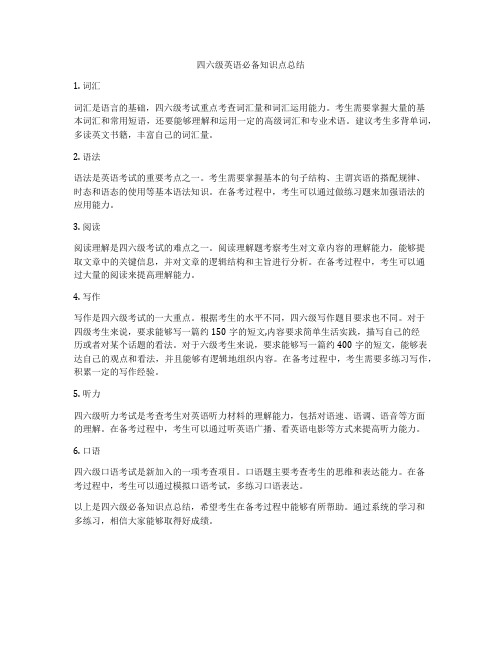
四六级英语必备知识点总结1. 词汇词汇是语言的基础,四六级考试重点考查词汇量和词汇运用能力。
考生需要掌握大量的基本词汇和常用短语,还要能够理解和运用一定的高级词汇和专业术语。
建议考生多背单词,多读英文书籍,丰富自己的词汇量。
2. 语法语法是英语考试的重要考点之一。
考生需要掌握基本的句子结构、主谓宾语的搭配规律、时态和语态的使用等基本语法知识。
在备考过程中,考生可以通过做练习题来加强语法的应用能力。
3. 阅读阅读理解是四六级考试的难点之一。
阅读理解题考察考生对文章内容的理解能力,能够提取文章中的关键信息,并对文章的逻辑结构和主旨进行分析。
在备考过程中,考生可以通过大量的阅读来提高理解能力。
4. 写作写作是四六级考试的一大重点。
根据考生的水平不同,四六级写作题目要求也不同。
对于四级考生来说,要求能够写一篇约150字的短文,内容要求简单生活实践,描写自己的经历或者对某个话题的看法。
对于六级考生来说,要求能够写一篇约400字的短文,能够表达自己的观点和看法,并且能够有逻辑地组织内容。
在备考过程中,考生需要多练习写作,积累一定的写作经验。
5. 听力四六级听力考试是考查考生对英语听力材料的理解能力,包括对语速、语调、语音等方面的理解。
在备考过程中,考生可以通过听英语广播、看英语电影等方式来提高听力能力。
6. 口语四六级口语考试是新加入的一项考查项目。
口语题主要考查考生的思维和表达能力。
在备考过程中,考生可以通过模拟口语考试,多练习口语表达。
以上是四六级必备知识点总结,希望考生在备考过程中能够有所帮助。
通过系统的学习和多练习,相信大家能够取得好成绩。
四六级复习方法(46gradereviewmethod).doc

四六级复习方法(46 grade review method)Ask questions about what you,re going to do or ask for advice, so the key to answering the question is to lock in the core words at the endFour. Scene analysiscational sceneProblem solving thought: the details of the affairs described by the teaching staff, the time, the place, the reasons for the delay or change of the plan are often the focus of the examination2.course selection sceneProblem solving: students think the course is too difficult and the load is too heavy3.make up a missed lesson sceneProblem solving thinking: scene characters are usually made up between classmates, in the process of makeup, one side will have some problems, and the other side will be given clarification4.thesis sceneProblem solving thinking: the scene characters are generally professors and students, or between students to discuss. The title of the paper is difficult to determine, the data is too difficult to find, the subject is too biased, can not find the data, the title is too large, too much information to find, too miscellaneous5.sports sceneProblem solving idea: the purpose is not competition, but fun, fitness, making friends. Some sports, such as CYCLING, often existin the form of TEAM, CLUB or ASSOCIATION6.renting sceneProblem solving thinking: students tend to find the house with the price, so the conditions of the house are generally poor. Oftenthere are some problems, because the house is tight.Looking for a house, renting the process is often not easy7.eating scenesProblem solving ideas: often in the process of eating, waiting for long waiting time, the food is not satisfactory, such as complaints, get compensation8.job related classProblem solving ideas: Applicants introduce their own situation, such as: education background, expertise, etc. , the general practitioners will introduce the nature of the work, wages and commuting time9.interview and discussion classProblem solving ideas: respondents in a certain aspect or a few aspects of success, visitors on a certain aspect of their achievements put forward problems, and by visitors to talk aboutexperience or experience, put forward the future plan, etc.Skills: pay attention to repeat words, they will usually give you some clues, will help you recall your name in the subject heard, pay attention to the different points of each of the options, some different names, locations, and different verbsFive: propositional researchMethods: pay attention to concentrate on listening to good essays at the beginning. Because of 4 love at the beginning of the article. In the center of the same word or the same words appear repeatedly in the paper, is also worth noting that with this kind of words can better reflect the options center, is usually the right answer. This once appeared in conjunction (because, so, due, to, etc. ) and the conjunctions (such as but, however, though etc.) a sentence should take special notice, these places are often sites.Grasp the digital time1.appear in the era, time, any of the digital, the digital time in the article must be the focus of the examination2.there are more than 2 digital time in the article, this sentence must contain answers3.digital time positioning, including the positioning of the age and the past, now contrast positioning 2 forms4.when the most advanced combination of digital time and comparative level, or the digital time appears at the beginning andend of the article, the answer must be nearbyNotice: the questions of reasoning and judgment questions are: What does the speaker most concerned about?Six. Compound dictation skillsFeatures: the singular and plural problems of nouns are always the focus of compound dictationMethods: the first time: full text reading, fill in the blank without pause, to listen to the main, with the text material to understand and grasp the whole content and context, by the way to fill in the words, remember a noteSecond times: try to remember the meanings of the sentences that you hear, and jot them down quicklyThird times: focus on listening to the parts of the listening, and check whether there is any error, to write complete sentences, rather than a single word or phraseNote: 1. a word can be heard or spelled out, not sure, can change words or change the way of expression. Try to faithfully express the meaning of the article without language errorsThe sentence is too long to accurately grasp each word, should strive to understand the meaning of the sentence, write down the main points and key words, and then try to express in their own words, words in general as content words, such as nouns, verbs, adjectives, adverbs and so on.The change of author's attitude and focus of discussion caused by 2. turning pointsThe answer is usually: Sounds great, Sounds a lot of fun, but...・3.words play an important role in solving problems and should be more careful when answering questions4 common types of questioning in listening1.theme questionsFor example: what is the best title for this passage?Methods: listen to the same words or the same words that appear repeatedly in the beginning of the passage and in the text, because the choice of words containing such words can better reflect the central idea, which is usually the correct answer.2.factual detailsThe details include: specific time, location, main characters or events, various figures, etc..Methods: the time of emergence is particularly sensitive to numbers. The causal conjunctions (because, so, due, to, etc.) and turn conjunctions (such as but, however, though, etc.) should also pay special attention to the sentences to be guided.3.judgments of right and wrongIn general, the word 〃not〃 will be stressed.4.inference questionsFor example: what does the speaker most concerned about?Methods: pay attention to the same content as the text is not inference, and must be based on the views of the short text, not from their own point of view to infer.Listening componentPart one: 8 small dialogues, 2 long dialogues. There are 3-4 questions after each long dialogueThe second part: 3 small articlesThe third part: Compound DictationMethods: you can preview the listening part of 9:55 - 10:00 option between an answer card and final audition time, make full use of this time to scan the Passage part of the three options, clarify the theme of this article, the 4 option 1 dialogue on air passage before 6 seconds time.Note: there are no instructions for listening test 3 before Section, and play the title directlySection A long dialogue section: the emphasis is usually on the answers to questions and answers, usually the order of thequestions and the consistency of the articleSection B part: seize the beginning and end of the article, the time, number, location information, reason and turn sentence are particularly easy to testSection C mainly to listen, to remember as a supplement. Some articles, auxiliary verbs can be omitted, such as longer phrases, the first letter of the first note of each word, or longer words only remember the first 3 letters.Listening often involves ten big scenes: learning, weather, hospitals, work, renting, entertainment, restaurants, courses, papers, library scenesFast readingMethods: the first is to skim, quickly understand the central idea of the article. First look at the title, and then read the first paragraph, seize the central idea, look at some of the other in the first sentence of a paragraph and the last sentence. Finally read end tail section. Then search read, focuses on the goal to find the specific information.Note: 1. fast reading, if there is no small title, you need to quickly browse the first paragraph of the first sentence and the last sentence, as we11 as the first sentence of each paragraph to understand the main content of the article2.propositions include time, character, place, cause and effect, comparative relation, conditional relation, purpose, mode, etc.3.words or phrases related to time: meanwhile, prior, to, etc.The word or phrase of the target relation: so, as, to, etc.Words or phrases of conditional relation: through, though, etc.Comparative relations of words or phrases: be like, contrary to, by contrast, as well as adjectives and adverbs of the comparative and superlative levelWords or phrases of causality: owing to, result from, be responsible for, etc.4.fill in the blanks after the sentences are correctly positioned,Carefully control the original and provided the missing parts to summarize the answer, pay attention to the accuracy of content and form.5.generally set the answer is 3 Y, 3 N, a NG.Understanding: NG question: NOT GIVEN, that is, the information given in the article is not sufficient enough to make judgmentsN question: inconsistent with the original information, accordingto the original information, we can judge that the expression of the problem is inconsistent with the original text, and NG is the original text without the support of relevant information(Note: the subject to judgment provided is synonymous substitution of the original or through changing concept, with the original or simply irrelevant.)Methods: the standard of non judgment is common1.statements consistent with the theme of the article, the judge must be Y, and vice versa must be N, it can not be NG2.deviate from the topic of the sentence, judge as NGmon sense statements, can only judge that it is not N, still need to further judge whether the article is talked about, such as talking about Y, otherwise NG4.statements that do not conform to common sense can only be judged that they are not Y, and if the article refers to N, otherwise it is NG5.the scope involved in the original text is broad, and in the subject it is concrete and judged as NG6., the reality and the view of the 2 can not be mixed, if the original and the title corresponding to the views and facts, can only be judged as NGBanked ClozeThe choice and use of adjectives1.in the BE verb or verb, you can choose to use adjectives as predicative, namely be/link v. adj.2.adverbs can modify adjectives. If the space is an adverb, you can also consider whether the space should be an adjective.For example: however, weather experts are still not completely -what leads to it or what affects how be. strong it willExplanation: this sentence is the lack of ARE is because of space, completely, can eliminate the blanks for noun possibility space should be an adjective or verb participle.The choice and use of adverbsIf the sentence in the space has a complete subject and predicate, it is necessary to consider whether an adverb is needed here and can be used to modify a degree of the verb. If the sentence structure in the space is complete (without the lack of necessary components), only the auxiliary elements such as attributes or adverbials are needed. Adverbs, for example, can be used as auxiliary elements.The choice and use of participle1.the past participle can be used as an adjective, indicating that the noun it modifies is a passive occurrence or something that has already happened.2.the present participle can be used as an adjective, indicating that its modified noun is an active or happening thing.Flexible use of contexte the theme of the text to determine the scope and color of the word meaningFor example: after intensive research, scientists have concludedthat politicians lie. In a study described in Britain s Observer newspaper Glen 〃,Newey a, political scientist at Britain s Universi ty of Strathclyde”, concluded that lying is an important part of --------------------- in the modern democracy.Interpretation: according to the content mentioned above and politician, political, democracy and other words, it can be inferred that the topic is "politics”, "poli tical system" and so on. If the vocabulary provided by the thesaurus has politics, journalists, affairs, mechanism, risk and so on, it is obvious that politics, is closely related to the topice the logical relationship between the sentences to determine the scope and color of the word meaningCoordinate relations: and also, likewise, similarlyProgressive relations: additionally, furthermore, moreover, in additionCausality: since, thus, hence, consequently, accordingly, due to, now that, such... . that转折关系:otherwise, whereas, nevertheless, by contrast, unfortunately让步关系:nevertheless条件关系:in case (of)四步解题1 .浏览全文,抓住中心2.阅读选项,词性分类例如:动词:participate, illustrate, donate 捐献reject 拒绝, 反对,否定Droop枯萎,低垂hie匆忙赶去count有重要性,有价值,计算glow发热,高兴,热情洋溢(名词时)喜悦,满足的心情touchstone试金石,标准calm使平静,使镇定(名词口寸)平静,镇定(形容词时)平静的,镇定的exist存在,生存estimate估计strike 打击notify 通知retail 零售generate 产生insult 冒犯,侮辱purchase购买形容词:financial, productive生产的,多产的credible可信的, 可靠的controversial有争议的,爱争论的tight紧的astonished惊讶的(动词时)使..•惊讶sufficient充分的ingenious机灵的,巧妙的,有创造性的difficult tropical完全的stable稳定的destructive破坏性的extreme极度的,最高的affordable买得起的voluntary自愿的excessive过多的,过分的副词:reluctantly 不情愿的completely 完全的deliberately 故意的technically技术上的really真正的primarily首要的,主要的名词:potential潜能,能力(形容词时)可能的,潜在的individual 个人,个体(形容词时)个人的,独自的,个体的intellectual知识分子,(形容词时)智力的,理性的florist花商, 花店replacement替换,替代品privilege特权store商店manners礼貌,风格,方式,方法figures数字,外形,外貌,人物(尤其指名人)(动词时)描绘,塑造,表示,认为,演算eagerness 热心热诚phenomenon 现实strength 力量starvation tTL 饿exhaustion疲惫,筋疲力尽scale尺度,天平gap差距,间隙介词:beyond多于,超过...3.照应前后,灵活选择问题:many older Americans find their job skills are still - ---- once they leave the paid work force.为什么应该填入构成被动被动语态的过去分词?4.复读全文,谨慎调整方法:只要选项里有出现课本上的单词或词组,选它.真正的有效的背单词的办法是从文章中,课文中,大量的阅读中去记住单词注意:1名词和动词的一词多义现象,对一个单词只掌握一种相对呆滞的一个意思是非常影响阅读质量的2词汇的近义,反义词的掌握,4级考试中正确答案往往是原文的同意改写3形容词和副词的意思,以及褒贬性,这直接有利于我们判断作者的态度及文章主旨,段落大意4重点掌握住一些固定词组搭配5对单词字义的揣测,一般只通过单词所在句或者前后句内容就能猜出.完形填空方法:1 了解大意注意:文章的开头1,2句话都是完整信息,这些句子揭示文章的背景只是或主题思想,仔细阅读,为后扫除障碍.2.初选答案注意:1. various各种各样的incredible难以置信的assignment 作业bring about导致,带来dubious = doubtful (有贬义,否定语气的)heat加热charge收费2. Take advantage of sth = make sure of sth.3.The same element in Gestalt refers to two or more options with the same meaning, the same grammatical function and the consistent usage. Once the same element appears in the options, they must not be the right answer.3.looking for cluesAttention: cloze is different from sentence and structure, and must start with the whole article.4.back to fill a vacancy5.check the answerSupplement: 1. run out of film film has run out, in which photo, film agreed to exchange.2.get the hangof it=not give up3.I don 't care much for desert=doesn, t appeal4.the more answers to listening, the greater the likelihood of error, that is, the answer is too specific, easy to make mistakes, summed up the general love to make the right answer.5.in listening, when girls ask for help from boys, boys don,thelp girls when they study. Learning is the most important thing.6.the last word in the listening dialogue often traps the wrong answers.7.on behalf of=you ' ve come in his place (linked to the original text, the same meaning).In 8. conversations, things are always going in the wrong direction.Requirements: 1. pay attention to the first sentence, grasp thefirst 2. speed reading text, grasp the idea of 3 indecisive,flexible answerreading comprehension1.factual detailsNote: each year is listed at the local compulsory, first, second,in addition. . , there are examples and analogy places, namely as, such, for instance and other placesThe law of the test: 1., copying or copying the original isgenerally not the answer, while the synonym replaces the correct answer.In the 2. option, the meaning is more specific, that is, the longer sentences are generally not the answers, while the general and abstract ones are the answers. More comprehensive and targeted expression of the central idea of the article, the option is generally the answer item.For example, there are 3. options in absolute tone words: must, never, merely, always, the, most, all, only, have, to, any, no, very, completely, none, hardly is not the answer, but not quite sure the tone of the word is the correct answer, such as could, might, possible, can, may. Should, usually, most, more or less (the majority), relatively be, likely to, whether or, not necessarily, often etc..In 4., the expression of meaning is more specific, superficial (literal meaning) is not the answer item generally, and the general, abstract, profound meaning is the answer item.The 5. option is more common than the common sense: the easy to understand is not always an option; it seems unreasonable, and the more difficult to understand is the right option. For example, 〃nevitable〃,the mood is too absolute. In addition, in the author's attitude, neutral attitude (neutral) is generally not an option. In the four option, there is an option that is very long or very short, and this option is often the right option. In the two option, if in addition to a word, the other part is completely the same, which tend to have a correct option. "None of the above"〃 is often used as an interference term.6., grasp the theme of the article, and then according to thecentral word in the word 〃dry〃 quickly return to the originaltext, positioning to a sentence or before and after the 2 words, and finally, according to the principle of synonymous rewrite, select the correct answer2.inference questionsMethods: the 1. option uses exploratory, not very absolute mood words, such as tend to, offten is generally the answer.2.coimnon logic is the answer.3.characteristics of various types of interferenceAttitude of correct option either affirmation, praise, praise of (such as positive, support, useful, interesting, admiring) or negation, criticism, negative (such as disgust, critical, negative, disappointment) and the negative and derogatory meaning. So the neutral words such as indifferent, ambivalent, neutral, humor, disinterested in these types of questions,Impassive) are generally interference terms.4., the ideal stepBrowse - skim through the full text - find out the problem position - start the answerFor the main theme, read only paragraph first, paragraph tail sentencecomposition1.highlight sentence patterns and vocabulary1.individuals, characters, folks replace (people, persons)2.positive, favorable, rosy (NICE), promising (hopefully), perfect, pleasurable, excellent, outstanding instead of good.3.dreadful, unfavorable, poor, adverse (bad) instead of bad, if bad can be less impressive sb.4.more and more二an increasing number of/a growing number ofMore and more important 二increasingly important2.proper use of passive instead of active, more objectivereflection of the facts. The beginning of the sentence can not always use I, my. do not use we should take effective measuresto. . . While using Effective measures should be taken to...3.good at using connectors or inserts, such as however, therefore, for example, etc.Some hold the opinion that. . Is replaced by Other individuals, however, take the attitude that...Main law1., do not test hot issues, such as this year's earthquake, the Olympic Games2.to argumentative writing, the basic structure: the firstparagraph: describe some phenomenon second paragraph: say the advantages and disadvantages of the third paragraph: your opinion3.write a announcement, describe a hypothetical event, a letter (only once, this is not prepared)4.08 there are 2 possibilities for English tests: argumentative writing, announcement, and focus on writing a announcementFor example, if you were selected as an excellent student representative this year, you should make a speech at the meeting on teacher,s day, which belongs to an applied writingLadies and Gentleman,First of all, please allow me to express the most heartfelt gratitude to all of our teachers. Because of your hardships in teaching, we can have such good grades.Teachers mold the lives that they influence. Lessons learned from teachers remain with their students throughout life. Teachers that break down barriers and reach into the souls of the students that they are responsible for do not get the recognition or gratitude they have earned. Many teachers are exhausted from their workload and responsibilities. They have their own families, financial and life stresses that challenge them along with everyone else. We should always respect our teachers.Our teachers told us that gratitude is a fruit future, of long cultivation. Our teachers made us what you are today and what you will be inOur teachers will certainly influence the whole life of more, allof us. All the efforts made by our teachers will encourage us to move on even translateMethods: 1. determine the key words to be investigated, which are usually composed of 2 words or phrases2. connect 2 English words or phrases3., combine the position and function of the translated text in the sentence, and pay attention to trap - inversion and non -predicate verbsFor example: Not only (he overcharged me), but he didn t do a good repair ' job either.Interpretation: the verb "charge" of the corresponding words,It should be "charge"". ”Too high" often uses too high or too much, because the main content is money, not temperature, we use regular collocation 〃niuch〃〃. The more clever word is "overcharge"':〃Not only〃・・・But. . .In the structure, the phenomenon of negative words leading to the head of the sentence is the sign of inversion. Combined with the general past tense of the second half sentence, we have to refine the auxiliary verb 〃did〃and translate it into 〃Not only did he me too much” or "Not only did he overcharge me z,according to the inverted structure charge”.Note: 1. according to the multiple principle in the comparison structure, the multiples number is placed at the beginning, andthen there is the as much+n.+as of the quantity2.〃Ba〃・・・ Attributable to...〃Translated as "attribute”.・・To. . . 〃〃Be likely to〃・・・〃 Meaning 〃easy〃, "possible" and so on. It follows that. . . This shows that3.the vast majority of negative sentences can not be directly added to 〃not〃〃・The verb behind the 4. have auxiliary verb can never be used as a prototype verb5.cannot... Too doesn,t go too farThe 6. part of a collective noun has the meaning of life as the subject predicate verb with plural forms, such as people, poultry, militia, and connected to the single component concept of predicate verb singular subject, contains some conjunctions (such as as well as, besides in, addition to), the number of predicate verb consistent with the first subject.7. happen at the same time or not have occurred with the present participle general or past participle, occurs before the main verb in the present participle complete type, have done; use the infinitive generally occurs after the main verbFigure 8. expression of feelings: lose interest in... Terrified, madIntroduce the influence of characters and people's evaluation of people: The people had come to spirit, love him as an inspiring leader. Lei Feng has been praised for his communistLight-hearted /absent-minded / lame in / strong-tempered /bad-tempered /near-sighted /far-sighted / silly / diligent are commonly used to describe characters, appearance and physical conditionFocus: verb phrases, attribute that represent causality... To.... Lead to, result in, result from, be to blame for, be responsiblefor are required to master the usage. Also, learn to use the spelling similar phrase ''contribute to〃,which means "helpful”, 〃yes〃・・・Make contributions”.。
4 6级英语 -回复

4 6级英语 -回复
对于英语四级和六级考试,首先需要全面掌握英语的听力、阅读、写作和口语能力。
在备考听力方面,可以通过大量的听力练习来提高理解能力,包括听力材料的听写和理解。
在阅读方面,需要阅读大量的英语文章,包括新闻、散文、小说等,以提高阅读速度和理解能力。
写作方面,需要多写作文,包括议论文、说明文、应用文等,提高写作表达能力。
口语方面,可以通过和外国人交流、参加口语角等方式来提高口语表达能力。
其次,建议多做真题练习,了解考试的题型和出题规律,逐步提高应试能力。
同时,也要注重积累词汇和语法知识,这对于阅读理解和写作至关重要。
背单词、学习常用短语和固定搭配,可以帮助提高语言表达能力。
此外,考生还需要注意时间分配和应试策略。
在考试中要合理安排时间,先做熟悉的题目,争取更多的时间用在难题上。
在考试中要保持冷静,仔细审题,理清思路,避免粗心错误。
最后,建议考生在备考过程中保持良好的心态,坚持不懈,相信自己的能力,勇敢面对考试,相信通过自己的努力一定能取得好
成绩。
综上所述,备考英语四级和六级考试需要全面提高听力、阅读、写作和口语能力,多做真题练习,积累词汇和语法知识,合理安排
时间和应试策略,保持良好心态,相信自己的能力,相信通过努力
一定能取得好成绩。
四、六级考试技巧总结(绝对有效)
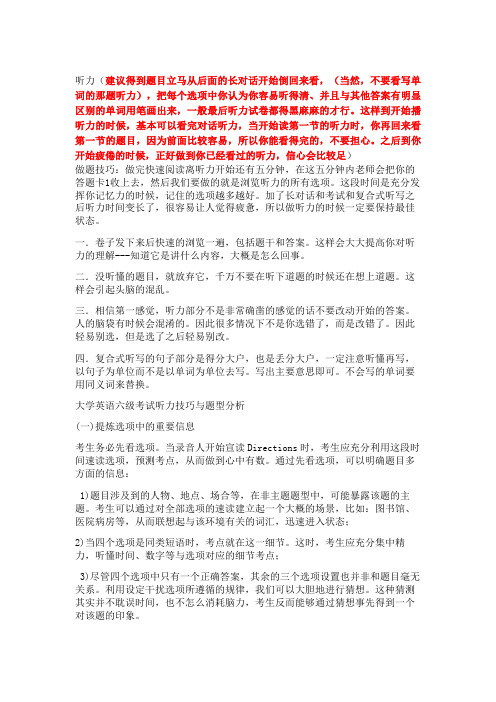
听力(建议得到题目立马从后面的长对话开始倒回来看,(当然,不要看写单词的那题听力),把每个选项中你认为你容易听得清、并且与其他答案有明显区别的单词用笔画出来,一般最后听力试卷都得黑麻麻的才行。
这样到开始播听力的时候,基本可以看完对话听力,当开始读第一节的听力时,你再回来看第一节的题目,因为前面比较容易,所以你能看得完的,不要担心。
之后到你开始疲倦的时候,正好做到你已经看过的听力,信心会比较足)做题技巧:做完快速阅读离听力开始还有五分钟,在这五分钟内老师会把你的答题卡1收上去,然后我们要做的就是浏览听力的所有选项。
这段时间是充分发挥你记忆力的时候,记住的选项越多越好。
加了长对话和考试和复合式听写之后听力时间变长了,很容易让人觉得疲惫,所以做听力的时候一定要保持最佳状态。
一.卷子发下来后快速的浏览一遍,包括题干和答案。
这样会大大提高你对听力的理解---知道它是讲什么内容,大概是怎么回事。
二.没听懂的题目,就放弃它,千万不要在听下道题的时候还在想上道题。
这样会引起头脑的混乱。
三.相信第一感觉,听力部分不是非常确凿的感觉的话不要改动开始的答案。
人的脑袋有时候会混淆的。
因此很多情况下不是你选错了,而是改错了。
因此轻易别选,但是选了之后轻易别改。
四.复合式听写的句子部分是得分大户,也是丢分大户,一定注意听懂再写,以句子为单位而不是以单词为单位去写。
写出主要意思即可。
不会写的单词要用同义词来替换。
大学英语六级考试听力技巧与题型分析(一)提炼选项中的重要信息考生务必先看选项。
当录音人开始宣读Directions时,考生应充分利用这段时间速读选项,预测考点,从而做到心中有数。
通过先看选项,可以明确题目多方面的信息:1)题目涉及到的人物、地点、场合等,在非主题题型中,可能暴露该题的主题。
考生可以通过对全部选项的速读建立起一个大概的场景,比如:图书馆、医院病房等,从而联想起与该环境有关的词汇,迅速进入状态;2)当四个选项是同类短语时,考点就在这一细节。
英语4,6级必杀技,考前一星期看

英语4,6级必杀技,考前一星期看-CAL-FENGHAI.-(YICAI)-Company One1听力一. 应试技巧以WHAT为提问词引导的问句1. 问”什么含义”What does the man imply?What does the woman’s answer suggest?What does the woman say about..(共出现32次)2. 问”从对话中能获得什么信息或结论”What can we learn/know about the man?What do we know fro m the woman’s reply?What can be inferred about…(共出现37次)3. 问”做什么”What does the man promise to do (共出现14次)4. 问”对某人或某事有什么看法’How does the man feel about… (出现4次)小结:在短对话部分,考查最多的是WHAT类的提问,其中细节的考查相对较少,推断型的相对较多一些.二:常见考题类型1原因与结果题特征:1.至少有一个选项暗示出该事实能导致某种结果,通常有好几个选项的事实能导致同一结果2.选项中可能出现can’t, not be able to, too….to,have to等词或词组.3.文章承上启下的作用的信息句a.表示文章顺序与层次的句子,一般由first,second, in the end, in addition, furthermore,finally引导.b.表示意思转折的句子,一般由but, however,on the contrary, instead, unfortunately,however, yet, although, nevertheless等词引导c.表示因果关系的句子,一般由because, since,for, thus, as a result等引导2.职业与身份题特征:大部分情况下,选择项是有固定格式的,要么是4个不同的职业,要么是4个不同身份的人短语:a little out of the way 有点远三. 长对话应试技巧注意:问答形式的对话是考试重点,往往落在其答语上.并且不是每一组问答都是重点,作为考试重点的几组问题之间的关联性是不大的.换句话说,第一个问题考查了文章的主旨,第二个问题开始分别考查对话中所呈现的几方面问题.其中每一个方面选择一个最重要的问题来考查.并且部分长对话还秉承了短文理解的一个重要的考查方式,就是在对话的开头部分一定会出题目方法:1.话题与场景的判断----第一句话中的核心词汇揭示答案在长对话中,寒暄过后的第一句话一般起到引出话题的作用,很可能是对话的主题所在,也是回答主旨,话题以及场景题的依据,正确的答案往往是核心词汇的重现,同义词,或者是由该单词所得出的自然的推论.2.细节题---听到什么选什么与短对话的区别就在于,短对话中一般采用的原则是听到什么就不选什么,而长对话恰恰相反,它考查的重点是那些含有实际意义的问答内容,尤其是特殊疑问句3.根据结尾处的核心词汇锁定答案长对话中一个出题规律就是在结尾处,针对将要做什么.或者提出什么建议进行提问.因此答题的关键就在于锁定结尾处的核心词四. 场景分析1. 教务场景解题思路:教务人员描述各项事务的细节问题,时间,地点,计划推迟或变更的原因等往往是考查的重点2. 选课场景解题思路:学生觉得课程太难,负荷太重3. 补课场景解题思路:场景人物一般是同学之间的补课,在补课过程中,一方会有一些问题,而另外一方将一一给予澄清4. 论文场景解题思路:场景人物一般是教授与学生,或者学生之间进行讨论.论文的题目难以确定,资料太难找,题目太偏,查不到资料,题目太大,要找的资料太多,太杂.5. 体育场景解题思路:目的不在于比赛,而是好玩,健身,交友.一些运动,如CYCLING,往往是以TEAM,CLUB或者ASSOCIATION的形式存在的6. 租房场景解题思路:学生一般倾向与找价格地的房子,所以房子的条件一般比较差.经常会出现一些毛病,由于房子紧张.找房子,租房子的过程往往很不容易7. 吃饭场景解题思路:往往在吃饭过程中,遇到等待时间过长,饭菜不如意等提出投诉,得到赔偿等8. 工作相关类解题思路:应聘者介绍自己的情况,如:教育背景,特长等,聘方人员一般要介绍工作的性质,工资待遇以及上下班时间9. 采访座谈类解题思路:被访者在某一方面或几方面比较成功,访问者就其某一方面的成就提出问题.并由被访问者谈体会或经验,提出以后的计划等.应试技巧:注意重复的词语,他们通常会给你一些线索,还会帮助你回忆你在题目中听过的名称,注意各个选项中的不同点,注意一些不同的名字,地点,以及不同的动词五:命题研究方法:注意集中精力听好短文开头.因为4级喜欢把中心置于文章的开头.文中反复出现同一单词或同一类单词,也值得注意,包含与这类单词的选项能较好的体现中心,通常是正确答案.文中一旦出现以因果连词(because, so, due to,等)和转折连词(如but, however, though等)引导的句子也要格外留心,这些地方往往是考点.抓数字时间1. 出现年代,时间,数字中的任何一种,文章中的数字时间肯定是考试重点2. 文章中出现2个以上的数字时间,该句肯定含有答案3. 数字时间定位包括年代定位和过去现在对比定位2种形式4. 数字时间和比较级最高级组合在一起的时候,或是数字时间出现在文章的开始和结束时,答案肯定在附近.注意:推理判断题的问法有:What does the speaker most concerned about?六.复合式听写应试技巧特点:名词的单复数问题一直是复合式听写考查名词的一个重点方法:第一遍:全文朗读,填空处无停顿,以听为主,借助文字材料理解和把握全篇内容和脉络,:顺便填写有把握的单词,记一点笔记第二遍:尽量记住所听的句子的各个意群,并快速记下.第三遍:着重弥补为听清的部分,并检查有无错误,要写完整的句子,而不是单个词或短语注意:1.某个单词为听清,或拼写不出,没有把握,可换词或改变表达方式.要尽量忠实的表达文章的意思而不出现语言错误.句子较长而无法准确抓住每个词,应力争听懂句意,记下要点和关键词语,然后试着用自己的话表达,关键词一般为实词,如名词,动词,形容词,副词等.2.转折引起的作者态度及谈论重点的变化回答通常是:Sounds great, Sounds a lot of fun, but…..3.尾词对于解题起着很大的干扰作用,答题时应多加小心听力的提问方式的常见4种类型1.主题思想题例如:what is the best title for this passage?方法:听好短文的开头和文中反复出现的同一词汇或同一类词汇,因为包含这类词汇的选项能较好的体现中心思想,其通常为正确答案。
一步一步教你两个月搞定六级(四级也行)的方法

我考六级的时候基本上有半年没有看英语了。
结果靠着四级的⽼本考了个70⼏分。
不过在我看来四级和六级是相通的,除了难⼀点外(主要是单词多⼀点),复习的⽅法都是⼀样的,我开始考研的时候还专门把六级和考研英语的难度做了个对⽐,当然主要是阅读。
反正我看来是六级的简单,我当时是六级的阅读基本上不会错,但是考研的就错的很惨。
不过复习了⼀段时间后我的考研英语也可以把错的题控制在3题以下了,我这⾥说的都是真题。
所以我觉的考研的英语主要是有个适应的过程罢了(我有时候觉的考研的英语有的题跟gre有⼀拼)。
说了好多题外话,还是回到六级吧。
⾸先我介绍⼀下⾃⼰的⽔平吧,我属于考试型的⼈才(有点悲哀哦),四级考了90多分,因为我准备了很长的时间(说实话完全是为了四级⽽准备)六级就向我上⾯说的,混的。
中国的考试的确不是⽐的智商,⽐的是耐性,当然你也不要把这作为⾃⼰考不好的理由,在这个社会就要想法去适应他。
就考试来说,我觉得我是适应了。
听⼒听⼒给我的感觉是难,我很长的时间没有听六级的听⼒了。
反正我考的时候我觉的是基本上听不懂(头都是⼤的),现在我就不知到了。
当然我的听⼒不知道现在怎么样,因为现在我们⼀个班有200号⼈,反正⾼中时我的听⼒在班上还是数⼀数⼆的。
所以我想听⼒是不⽤去怕的,你不懂⼤家都不懂。
如果你想好好搞搞英语听⼒,短期内是不可能的。
我想⼤家都是想突击⼀下,我觉得听⼒短期是不好提⾼的(就分数来说),不过中国有句话,叫上有政策,下有对策。
提⾼个2-3分还是有可能的。
我有⼏个⽅法,⼤家可以随便的选1。
你的英语如果太差,连四级的都听不懂(是完全都不懂),就有点⿇烦了,我没办法帮你(^-^)2。
你四级还听得懂⼀部分,那么你就以四级的听⼒为主吧,但是每听⼀个题,或是⼀年的真题,⼀定要保证把其中的每个部分都搞懂,每个词的意思是什么都要搞懂听熟。
考前⾄少要把10年的都做完,还有2个⽉,⼀个星期做个⼀套,8套是最低的标准了。
还有,切记考前⼀定要把近⼏年的六级题拿来听个⼏遍,不要求细听,但是⼀定要适应那种速度,按照考场上的要求去做。
- 1、下载文档前请自行甄别文档内容的完整性,平台不提供额外的编辑、内容补充、找答案等附加服务。
- 2、"仅部分预览"的文档,不可在线预览部分如存在完整性等问题,可反馈申请退款(可完整预览的文档不适用该条件!)。
- 3、如文档侵犯您的权益,请联系客服反馈,我们会尽快为您处理(人工客服工作时间:9:00-18:30)。
根据本人的四六级考试经验再加上自己这几年对四六考试的观察,我要说两句,当让,这只是我个人的见解,定有不足之处,望大家吸收其长处,来改善自己的四六级应试与考试心理。
虽然说四六级要改革,但我想目前还是改不了那么快,不过大家还是尽快考吧,新的来了肯定不适应。
下面给大家小解四六级考试之大意。
现行的考试由四部分组成,听力、阅读、综合和写作。
听力部分:听力是很多同学头疼的一块,我发现很多同学四六级差一点但没过都是卡在听力上的。
很多人认为听力很难,因此平时就放弃听力的提高机会,想从其他方面多提高一点,其实我觉得这是一个很大的误区。
真正说难提高的我觉得是阅读,我觉得除了掌握正确阅读技巧之外,长期的训练才会有好的效果,阅读的提高没大家想的那么容易。
综合部分主要考查词汇的运用,我觉得六级考试最难考的部分就是它了,虽然有的人把六级词汇背个两三遍,但不见得在这方面能拿好分数,这部分对词汇的要求实在有些过高,有些选项很牵强。
从性价比角度上说我觉得在这里浪费那么多时间和精力是不值得的。
我希望大家从心理上消除听力难得障碍,而且对于一个想把英语学好的人来说,听力的能力是很重要的。
六级英语的听力一点都不难。
听力差主要有几方面的原因。
一是语音不过关,很多人背单词不记忆读音,听力的时候就不知道自己听的是哪个词,自然听不好。
或者有的同学发音不标准,都是造成听到单词没反应的原因,对这些同学,应该纠正自己的读音。
星火式的(或新东方)词汇书是有配套磁带的,建议跟读,但是切记要音、型、意面面俱到。
第二个原因就是不适应听力的语境,听得太少。
其实四六级听力考来考去那些段子都是在生活和校园里经常出现的对话,大家可以通过看历年真题的听力文字多熟悉题目,你看多了就会发现做起题来简单很多。
这就是为什么我们读过或背过的文字再去听一般都能听懂。
第三个原因是对文化背景和常用短语的不熟悉,造成理解上的障碍。
英文口语中有很多口语化的词汇是我们平时读课本没见过的,但是在听力段子里经常出现。
所以我们只能积极一点,材料的获得如果你懒,就多搜集历年真题,把里面出现的你不懂得和出现频率高的短语和口语化词汇句型专门写出来,也就一两张纸吧。
对于文化背景,有可能就尽可能多了解,但在考试的时候最多影响你一两道题,不是太可怕。
当你找到自己听力差的原因的时候,对症下药,一般来说都会有很大提高的。
而且一般说来,你现在的听力水平越差,你能提高进步的幅度就越大。
可以让你的成绩上一大个台阶。
所以一定要对自己有信心!如何解决听力问题呢?我觉得要提高英语水平,不管是哪方面的,都要精泛结合。
所谓的精泛结合就是在认真研究如何提高英语能力(——所谓的精)的同时通过大量的训练(泛)巩固提高,从而达到最好的效果。
有的人总是一天到晚拿个耳机在听,但始终没设么提高,反而养成了一听力就困的坏习惯。
对于听力基础不太好的同学,我的建议是先多精听。
精到什么程度呢?我觉得有一个特别有效的方法就是你抽两三套历年真题,拿着随身听和纸笔,把题目和答案收起来,跟着磁带听一句写一句。
别笑这个方法,实践过的人都承认这个方法非常好,至于为什么好,我花非常多笔墨也讲不完,我建议大家按照这个方法去做。
一来练好听力,二来也可以锻炼自己的耐性。
我说一下具体做法吧。
听一句把机子暂停写一句,如果没听清,倒带回去听,直到你听懂为止。
听清楚了再下一句。
如果一句话你听了很多遍都没听明白,那就放那做个记号,等你听完整套题的时候,把它的听力答案拿出来一一对照,边听边修改。
找找自己没听出来的原因(按照我上面说的三方面愿因去找),只有你真正自己这样做过,才知道自己的差距到底在哪,才能真正提高听力水平。
大家不要怕花时间,其实花不了很多时间的,你只要精听几套题就够了,用不着把所有的都听下来,你就已经有很大进步了。
如果近几年听力都有听写段子的话,说明它已经成为一种趋势了,大家就只要听历年真题的第一部分短对话就行了。
短对话的提高相当快,可以节省很多时间。
但对于长对话考不考,你们应该了解比我多,我不敢妄下结论。
听一套题十道题用不了多少时间的,刚开始会比较不顺利,但坚持下去,你会有很大收获的,其实这个方法是托福雅思听力人常用的方法,特别管用,会让你的听力实力有很大提高,在你精听几套题之后,做大量泛听,你会发现听的感觉不一样了。
过一段时间再把听过的题拿来听写,经常精泛结合,到考试的时候听力水平基本上就很稳定了。
建议起步阶段坚持一个星期的精听,每天坚持1个小时,听写完好好分析总结,有兴趣可以跟着磁带模仿着读,这种效果也很好。
听写部分如果能这样做最好,不过没时间的话,我觉得有了前面的训练、已经扫除一定障碍了,主要是把单词写对了,还有后面三题写句子可能需要一点综合能力。
我觉得在前期准备的时候多花点时间在听力上为好阅读部分:阅读确实是比较难提高的,如果你现在阅读水平不错,只要自己仔细研究一下真题的套路就行了。
对于阅读上漏洞比较大的同学,要有足够的重视,听力+阅读是考试中的重头戏,直接影响到你的整体分数,说实话如果这两部分做的不好的,你的另外两部分也好不到哪去,你只要把这60%的题做好了,剩下的捡一些分就过了。
当然对于那些想拿超高分的人,也就不屑于我说的这些话了。
我算过,做好听力和阅读,作文再重视一下,综合部分随便拿点分,你要考得好,600也是有可能拿到的。
阅读的题总结来总结去,不外乎两种类型:主旨题和细节题。
主旨题的难度一般说来难度不大,大家在训练的时候只要能抓住文章大意就可以了,尽量保证把这类题做对。
一般来说文章首段和每段首句中隐含了较多主旨方面的信息,所以在考虑的时候不要过于重视细节,一般认真分析之后不太容易做错,错了就不太应该了。
细节题的考察范围很广,有的考察词汇或句子的含义,有的问你某个细节性问题,更难一点的让你做出一定的推断。
推断题的错误率经常较高,但其实大家看看答案就会发现错就错在想得太远了,推断只要想到最直接最简单的就够了,这是中国学生最容易犯的毛病。
词汇和句意题一方面要结合上下文,对词汇和句子的掌握也有一定的要求。
这种题有时候可以猜,猜不了就只有看你的老底了。
其他细节题主要是在文章中找到对应区间认真分析,难度也不是太大。
关键要区间定位准确。
阅读的最好方法是先浏览一遍,了解文章大意,理清楚每一段讲了些什么,主旨题基本可以先做。
然后看完所有题目,把细节题对回原文定位,通过对相关语句的分析找出答案。
有的人习惯先看答案再看文章,不是说不可行,要是一时改不过来,也不勉强。
其实这样做有一个很大的弊端就是你老是想去找跟题目对应的字眼,但有时题目在文章中换了字眼,效率很低,而且主旨题也容易出错。
如果现在还有一定的时间,最好能改变阅读方式,也有利于将来在阅读上的发展。
阅读还有一个问题是时间,考试时间有限,所以大家一定要在正确率和速度之间做一个权衡,不要影响其它部分的考试。
我建议大家先做阅读后做综合部分,有的人在词汇上花很多时间,但其实拿不了多少分,尽量保证把阅读做好。
但也不要全花在阅读上了,考试策略很重要。
其实阅读做的太慢了,也不见得你就能得高分,还是要用正确的方法去取得相对较好的效果。
对于句子的语法分析,不要钻得过难,只要不影响句意理解就够了。
六级考试会有一些长难句,不过这种句子答案部分解释都很详细,大家看懂就行。
综合部分:这一部分大多数人拿不到好分数,即使是那些成绩出来不错的人,说实话我觉得这部分题没什么意思,只要是能捡的分你就捡一点。
但大家不要因为不重视这部分就不背单词了。
单词是要背的,不然阅读会有比较大的障碍,我的背单词要求是在阅读里出现的时候你能大概知道意思,不管怎么说你背过单词,综合部分一些基本题你还是会做的,我只是建议大家不要在这块上花太多的无用功,因为这部分对单词掌握的要求太高了,大家不如临考前一个月做做真题,对对答案,其实高频词考的重复率挺高的。
写作部分:写作大家不用怕,只要考前一个月多练练就行,重要的是要言之有理,理清思路,内容丰富一些,如果要让语言好一点,可以考虑把一些简单词用高级的词替换,比如说重要,别老用important,你可以用cardinal, essential, vital等等,这些东西平时注意积累一下,再背几个漂亮的句子,句式要注意变换,别老用定语从句,我觉得要写得好,还是平时背些好词好句。
以我的经验,作文考得不好的肯定考前没好好练,不需要写很多,关键是写了之后好好修改一下,收获会很大的。
对于市面上的四六级范文,我觉得没什么必要花时间在那种书上,还是要自己写了多总结。
如果说怎样能写得好一点,我不知道四六级作文在网上能否找到模版,托福雅思是有的,大家可以去找找看。
当然本人把四六级作文总结成十句话,只要灵活运用这十句话,可以确保大家能够在作文上得到很高的分数。
最经典的十句话在我们的网站上 .关于备考安排有很多人对复习都没有什么好的安排,表面上很重视,可是没有具体的行动。
我觉得要有一个总体的安排。
情况是因人而异的。
如果你自信英语水平不错,考试不在话下,你就可以不用复习了,考前做几套题就行了。
我考得时候,半个月看了一下单词,其实什么都没记住,等于无用功,考前三天只做了听力,就上考场了,考了五百多,也马马虎虎啦。
你要是对自己没把握,或者考了几次都没过,那你就要引起重视了。
临时抱佛脚是不会有效果的,四级可能还行,六级毕竟比四级难,不要抱侥幸心理。
现在离六月的考试还有三个月,一定抓紧时间,时间是过得很快的。
当你觉得时间还很多的时候,一晃马上就考了。
很多同学到最后都临时突击,考一次突击一次,突击了好几次都没过,不是浪费时间吗?如果有一个好的安排,花点时间,肯定能过。
所以大家一定要摆正心态。
备考的第一步是扫除单词障碍,对于不打算拿很高分数的同学,你只要认识单词就行了,不必深究单词之间过多的辨析,保证你在阅读时能认得,听力是能听懂就可以了。
大概花一个月的时间把单词背完,只背五六级的词就够了。
我要说说单词该怎样去背。
大家背单词千万不要第一次太过于认真,你再认真记忆效果也不见得好,背词在于多反复,要坚持,这是背单词最关键的。
我建议大家在背词的一个月里好好安排计划,注意昨天背的第二天一定要回去复习,否则你无论背多少时间都记不住的。
还有一点重要的是背单词的时候一定要注意力集中,才有效果。
接下来就是各项突破。
根据个人情况的不同,侧重点也不一样。
根据自己的情况调整,我只是给出一个总的规划,供大家参考:考前三个月:背完一遍单词考前两个月:听力和阅读突破,巩固词汇考前一个月:综合部分,通过做真题掌握词汇写作每星期两篇,记得反复修改最后十天:每天按两小时模拟考试,总结经验(用近几年的真题) 我还想说一点就是大家复习的时候一定要用真题,任何的模拟题都是没有效果的。
既然复习,就要每天坚持,说实话学英语还是要靠自己,没有特别的捷径,我之所以写了这么多,就是希望后人能够在复习的时候按照正确的方法,提高效率。
